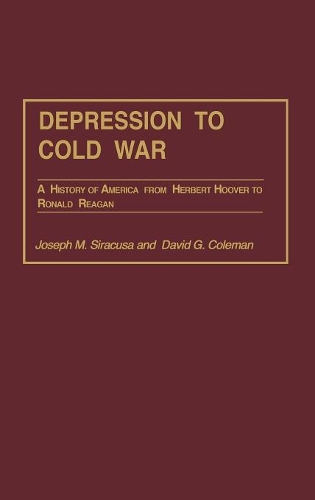
Depression to Cold War: A History of America from Herbert Hoover to Ronald Reagan
(Hardback)
Publishing Details
Depression to Cold War: A History of America from Herbert Hoover to Ronald Reagan
By (Author) Joseph M. Siracusa
By (author) David G. Coleman
Bloomsbury Publishing PLC
Praeger Publishers Inc
30th August 2002
United States
Classifications
Tertiary Education
Non Fiction
International relations
973.9
Physical Properties
Hardback
328
Description
Organized around the office of the president, this study focuses on American behavior at home and abroad from the Great Depression to the end of the Cold War. Organized around the office of the president, this study focuses on American behavior at home and abroad from the Great Depression to the onset of the end of the Cold War, two key points during which America sought a re-definition of its proper relationship to the world. Domestically, American society continued the process of industrialization and urbanization that had begun in the 19th century. Urban grownth accompanied industrialism, and more and more Americans lived in cities. Because of industrial growth and the consequent interest in foreign markets, the United States became a major world power. American actions as a nation, whether as positive attempts to mold events abroad or as negative efforts to enjoy material abundance in relative political isolation, could not help but affect the course of world history. Under President Hoover, the federal government was still a comparatively small enterprise; challenges of the next six decades would transform it almost beyond belief, touching in one way or another almost every facet of American life. Before the New Deal, few Americans expected the government to do anything for them. By the end of the Second World War and in the aftermath of the Great Depression, however, Americans had turned to Washington for help. Even the popular Reagan presidency of the 1980s, the most conservative since Hoover, would fail to undo the basic New Deal commitment to assist struggling Americans. There would be no turning back the clock, at home or abroad.
Reviews
"Depression to Cold War: A History of America from Herbert Hoover to Ronald Reagan is a lively, stimulating account that thoughtfully weaves together the challenging and fiercely debated domestic issues with the varied and frequently controversial foreign policy decisions."-Richard Dean Burns California State University, Los Angeles
Siracusa and Coleman have produced a useful survey text of US political history from the Hoover presidency to the "Reagan Revolution" and the ending of the Cold War. Well written, solidly researched, and ideologically balanced, this book will serve as a handy guide to political events in the mid-20th-century US....a trustworthy reference for modern US political history. Recommended. Collections serving general readers and upper-division undergraduates.-Choice
"Siracusa and Coleman have produced a useful survey text of US political history from the Hoover presidency to the "Reagan Revolution" and the ending of the Cold War. Well written, solidly researched, and ideologically balanced, this book will serve as a handy guide to political events in the mid-20th-century US....a trustworthy reference for modern US political history. Recommended. Collections serving general readers and upper-division undergraduates."-Choice
Author Bio
JOSEPH M. SIRACUSA is a Visiting Research Fellow in the Key Centre for Ethics, Law, Justice and Governance, Griffith University, Brisbane, Australia. DAVID G. COLEMAN is Assistant Professor at the Miller Center of Public Affairs at the University of Virginia.
